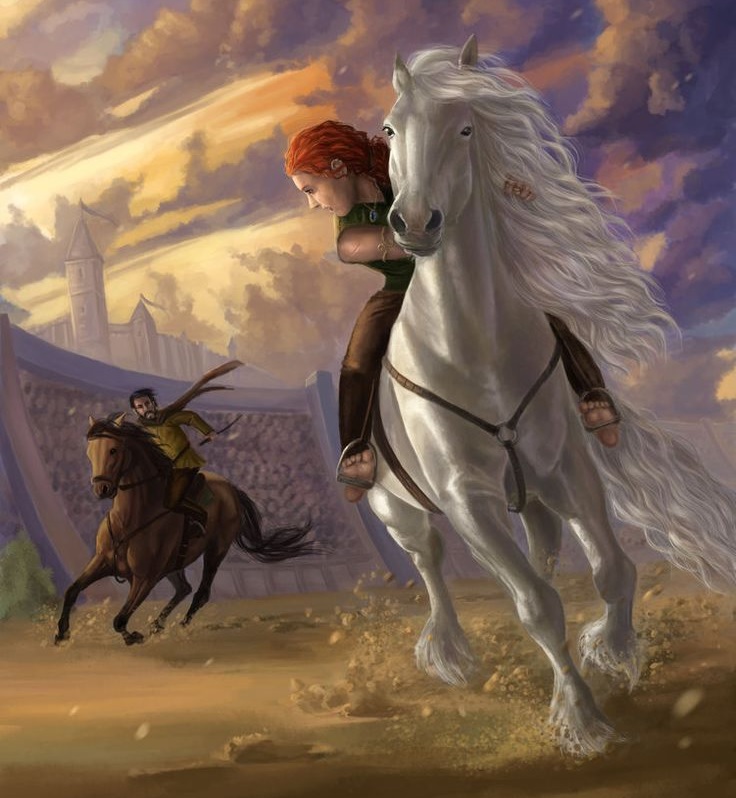Difference between revisions of "Horseracing (sage ability)"
Tao alexis (talk | contribs) |
Tao alexis (talk | contribs) |
||
| Line 4: | Line 4: | ||
Winning a race is a combination of a horse's four [[Horse Breeding (sage ability)#Pedigree|physical attributes]]: speed, robustness, courage and health, with their listed importance in that order. Add to this the weight of the rider, the number of knowledge points the rider possesses, the length of and condition of the track being run and the type of race it is. | Winning a race is a combination of a horse's four [[Horse Breeding (sage ability)#Pedigree|physical attributes]]: speed, robustness, courage and health, with their listed importance in that order. Add to this the weight of the rider, the number of knowledge points the rider possesses, the length of and condition of the track being run and the type of race it is. | ||
| − | Dice are rolled in the process of determining the winner — but the weight given to these dice are deliberately minimal and in fact | + | Dice are rolled in the process of determining the winner — but the weight given to these dice are deliberately minimal, and in fact are rarely the deciding factor. For the most part, races are won before they're run, by the statistics of each animal and rider; but as these numbers are not known, except to the DM, it requires an actual race to reveal the winner. |
== Amateur Jockey == | == Amateur Jockey == | ||
Revision as of 21:13, 6 October 2021
Horseracing is an expert-status sage ability that gives the player acumen at urging horses to greater speed in horseracing, while getting the most from a horse's physique. The ability provides recognition of a horse's shape and musculature that suggests it's capable of winning a race.
Winning a race is a combination of a horse's four physical attributes: speed, robustness, courage and health, with their listed importance in that order. Add to this the weight of the rider, the number of knowledge points the rider possesses, the length of and condition of the track being run and the type of race it is.
Dice are rolled in the process of determining the winner — but the weight given to these dice are deliberately minimal, and in fact are rarely the deciding factor. For the most part, races are won before they're run, by the statistics of each animal and rider; but as these numbers are not known, except to the DM, it requires an actual race to reveal the winner.
Amateur Jockey
Riders without any horseracing skill must have a minumum of handling I ability, but in the race they are effectively dead weight the horse must carry. It's possible that a horse far-and-away superior from its competition would carry such a rider to victory, but unlikely.
Authority Jockey
Once a character has achieved authority-status in horseback riding, they may reduce their body weight by the number of knowledge points they possess. For example, a character weighing 145 lbs., with a knowledge of 38 in horseback riding, would count as an additional 107 lbs. above the horse's mass. The rider is an afterthought to the weight of a horse, but even a small difference can matter when horses are very close; naturally, the smaller the rider, the better.
Expert Jockey
In addition to the adjustment of mass discussed above, experts are familiar with numerous tricks to get the most from a horse's speed and courage. In the expert rider's hands, the horse's speed and courage are both counted at 1 point higher than the natural number. Thus, a horse with a speed of 19 would count as a 20 in an expert's hands.
Experts also receive a +3 bonus to their dexterity when participating in a Steeplechase. In an endurance race, involving distances of hundreds of miles, experts are able to increase a horse's robustness by 1 point, while enabling horses to heal 1 hp/day without requiring them to rest. This healing ability is limited to four days per single competition, within the space of the first week. After this time, the horse is too tired to be healed.
Obviously, these additional skills make it far more likely that an expert will win a race, even upon an slightly inferior animal. Therefore, except in local events, all riders in a competition are sure to be experts.
See Horseback Riding
